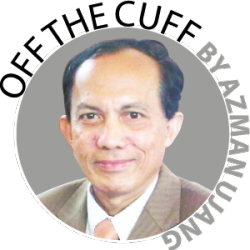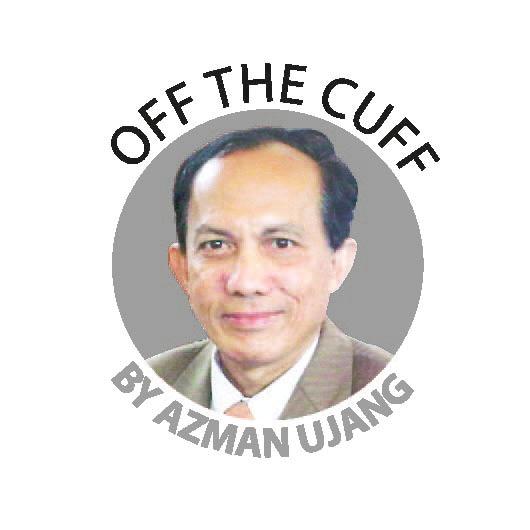THIS past week has been a particularly tragic period as road crashes claimed more lives in harrowing circumstances.
Five members of a family, including three mothers and a nine-month-old baby died in a crash on the North-South Expressway (managed by PLUS) near Sungai Buloh around midnight on Saturday.
Our heart goes out to the bereaved families and no words could amply describe their grief while those of us who read or heard the news couldn’t help shedding tears.
The car the victims were in hit the median guardrail, went out of control before it was rammed from the back by an SUV.
Four of the victims were flung out of the car by the impact. Two died on the spot and the others at Sungai Buloh Hospital.
Two days later, reports of another accident sent shockwaves in Japan and the world of badminton.
Japan’s World No 1 star, Kento Momota, fortunately survived this crash involving a van ferrying him to Kuala Lumpur International Airport at 4.30am on Monday. He was scheduled to catch a flight home after winning the Malaysian Masters title.
The van driver, whose vehicle had crashed into the back of a 30-ton truck, died on the spot.
Over the past few days, the road crash was hot news in Japan and when Momota arrived in Tokyo on Wednesday, his return was broadcast live.
It must have come as a huge relief for the Japanese as Momota is their best hope to win a gold medal at the Olympic Games which Japan will host in August.
The two crashes that occurred at what I call uncivilised hours at midnight and 4.30am could well be due to what is technically known as sleep-deprived driving or sleepy drivers.
All drivers are aware that even dozing off for less than a second could result in their vehicles being thrown off the lane, hitting a guardrail or worse, hitting other road users.
And organisers of international sports events, especially where world stars are involved, should ensure drivers on late night duty have had enough sleep.
The Road Safety Department and the Malaysian Institute of Road Safety Research should enhance their road safety advocacy including creating public awareness of the high risk of sleep-deprived driving.
Common sense suggests that sleep-deprived driving is a major cause of fatal crashes but officially it’s not mentioned as such because in cases where the driver is killed, there’s no way to conclusively determine the driver’s condition before the crash. As the saying goes, dead men tell no tales.
Our highways are inundated with billboards advertising products and services, which of course earn good money for the highway operators, but have you seen any billboard with a “Don’t Drive While Sleepy” public service message? Or something to that effect.
None. Is it because such billboards don’t earn advertising money? I don’t know.
As alluded to many times in this column, the greatest threat to road safety in Malaysia is to motorcyclists.
The riders on nimble small-engine motorcycles better known as kapcai are by far the most vulnerable to fatal crashes and the statistics are too horrifying to keep repeating and they speak for themselves and more.
It’s sad, in fact, shocking that although more people were killed in motorcycle crashes in Malaysia in a year than from natural disasters around the world, it hardly has pricked our national conscience or triggered a national debate.
In the past year or so, a WhatsApp group has emerged to call for stronger advocacy on road safety with the focus on motorcyclists given their predominance on roads and highways.
Their campaigns are gathering momentum and recently, a significant thing happened.
A letter signed by 14 medical specialists and consultants was published by newspapers and social media expressing deep concern about the rising death toll of motorcyclists, mostly in the youth age group.
“We write this as concerned specialists and consultants from various specialities who have treated victims of traffic injuries and see too many prematurely die from this totally preventable cause of death. This puts us in a unique position to appreciate the dangers of motorcycling in Malaysia and to call for urgent action to increase the safety of road users in Malaysia, especially motorcyclists,” says the letter.
All forms of road injuries are unacceptable but motorcyclists contribute disproportionately to road deaths and injuries. As the victims are much younger with their entire lives ahead of them, this is an issue that everyone needs to address as a nation.
Their letter cites grim figures. In 2017 alone, 7,152 Malaysians died from traffic injuries and this is equivalent to one Boeing 747 jet crashing with no survivors every month!
Of course it’s just to show the astronomical number of road deaths while in reality, Boeing 747s are one of the safest aircraft to fly.
It’s noteworthy that these doctors and consultants stressed the fact that these deaths are “totally preventable”.
Their strongly worded letter also aptly described these deaths as senseless and premature given the added suffering from injuries and financial burden. Injuries are the nation’s fourth largest category of hospital admissions.
Last year, insurers in Malaysia paid out RM5.5 billion in claims related to traffic crashes while in economic terms, the annual loss of 7,000 lives mostly among the young, costs the country a staggering RM7 billion each year.
“There is an unquantifiable loss of human capital on top of the emotional and moral costs,” says the letter.
As a motorcycle safety activist myself, I must salute and congratulate them for lending their strong voice and advocacy in trying to save the lives of our motorcyclists, while at the same time appealing to the government to treat road safety with a greater sense of urgency.
I wish here to appeal to Youth and Sports Minister Syed Saddiq Syed Abdul Rahman to speak out, too, as thousands of youth are risking their lives by speeding on bikes daily.
This makes much more sense than his ministry promoting the gig economy via the use of more and more motorcycles adding on to our huge and uncontrolled numbers of kapcai.
I sign off this column by adding what the former Japanese ambassador to Malaysia, Dr Makio Miyagawa told me the other day about his observation of Malaysian motorcyclists after nearly six years in the country as of last October.
Dr Miyagawa, who was on holiday here with his family two weeks ago, said he was appalled by the motorcycle riding culture in Malaysia and the riders’ apathy in risking their lives.
“We have to tell the youths who risk their lives for joy that they are committing grave disrespect to their parents who created their life. In Japan, we are told that from hair to skin, a person was given all his body by his parents. Not hurting your body is fundamental to filial piety,” he said.
These are poignant and solemn words of advice to motorcyclists to love life and their loved ones whom they must not leave behind prematurely just for the thrill of speeding or reckless riding which is very much the Malaysian motorcycling culture.
Comment: letters@thesundaily.com











